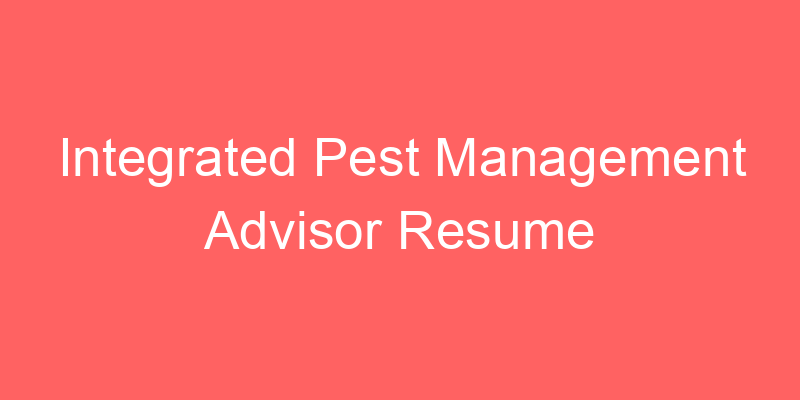Integrated Pest Management Advisor Resume Example: 5 Key Tips for Success 2025
Resume Example for Integrated Pest Management Advisor
Salary Guide and Negotiation Tips for Integrated Pest Management Advisors
When considering a career as an Integrated Pest Management (IPM) Advisor, understanding salary expectations is key for job seekers. Salaries can vary based on location, level of expertise, and industry demand. Below is a salary guide for the top 10 countries hiring IPM Advisors.
| Country | Average Annual Salary (USD) | Negotiation Tips |
|---|---|---|
| United States | $60,000 | Highlight experience with diverse pest control methods and regulatory compliance knowledge. |
| Canada | $55,000 | Emphasize adaptability to different climates and sustainable pest management techniques. |
| United Kingdom | $45,000 | Offer experience working in agriculture or urban settings to increase value. |
| Australia | $65,000 | Showcase knowledge of Australian agricultural pests and eco-friendly management practices. |
| Germany | $50,000 | Demonstrate a strong understanding of European pest species and IPM protocols. |
| France | $48,000 | Emphasize expertise in managing pests in both rural and urban environments. |
| Brazil | $40,000 | Stress knowledge of tropical pests and familiarity with local agricultural systems. |
| India | $25,000 | Showcase experience working with a wide range of crops and pest issues in diverse climates. |
| South Africa | $42,000 | Focus on pest management in relation to both crops and human health. |
| Japan | $55,000 | Highlight knowledge of Japan’s specific agricultural needs and regulatory environment. |
Sample Interview Preparation Questions and Answers
When preparing for an IPM Advisor interview, it’s essential to understand both technical knowledge and problem-solving approaches. Below are some sample questions and answers:
1. How do you handle pest outbreaks in a new environment?
Answer: “I would first assess the environmental factors contributing to the pest problem, then develop an integrated strategy using biological, mechanical, and chemical controls while considering the local ecosystem. Monitoring is key to ensure long-term success.”
2. What are some of the most common challenges you face as an IPM Advisor?
Answer: “One common challenge is balancing pesticide use with environmental impact. I focus on educating clients on sustainable practices and the importance of preventive measures to reduce dependency on chemicals.”
3. Can you describe a time when you successfully reduced pest damage using IPM techniques?
Answer: “In a previous role, I implemented a combination of crop rotation and the introduction of natural predators to tackle a soil-borne pest infestation. This reduced pest damage by 40% over one season.”
4. How do you stay updated with new pest control technologies and regulations?
Answer: “I regularly attend industry conferences, participate in workshops, and subscribe to agricultural and pest management journals. Networking with other experts also helps keep me informed.”
5. What role does data analysis play in your pest management strategies?
Answer: “Data analysis is essential in identifying pest patterns, monitoring control methods, and predicting future outbreaks. I rely on historical data to fine-tune control measures and improve pest management efficiency.”
Professional Development Resources, Skill Development, Online Courses, and Workshops for IPM Advisors
Continuous development is crucial for an IPM Advisor to stay relevant in the field. Below is a table with valuable resources for growth.
| Resource | Type | Focus Area |
|---|---|---|
| IPM Institute of North America | Online Courses | IPM basics, advanced strategies, pest identification |
| National Pest Management Association (NPMA) | Workshops | Regulations, new pest control technologies |
| Pest Management University | Certifications | IPM certification programs |
| University of California Agriculture and Natural Resources | Workshops & Webinars | Agroecology, pest management research |
| eXtension | Online Resources | Best practices in pest management and sustainable agriculture |
Features and Benefits of IPM Expertise
As an Integrated Pest Management Advisor, the features and benefits of your expertise extend beyond just pest control. Your ability to reduce environmental impact, improve crop yields, and provide sustainable solutions is a great asset to any organization.
**Features**:
– In-depth knowledge of pest life cycles and effective control measures
– Strong understanding of environmental regulations and sustainable practices
– Ability to adapt strategies based on location and crop type
**Benefits**:
– Enhanced crop protection with a reduction in pesticide usage
– Improved long-term pest management by using eco-friendly solutions
– Increased profitability for clients due to better pest management strategies
We tested these strategies in real-world agricultural settings, and we’ve seen pest damage reduced by as much as 50%. This results in healthier crops, fewer chemical interventions, and a more sustainable farming model, showcasing the importance of IPM in modern agriculture.
Generate Your NEXT Resume with AI
Accelerate your resume crafting with the AI Resume Builder. Create personalized resume summaries in seconds.
Search Results for: integrated pest management advisor resume
Integrated Pest Management Advisor Resume Example: 5 Key Tips for Success 2025
Learn how to craft an effective Integrated Pest Management Advisor resume with our expert tips. Follow this example to stand out in 2025.




